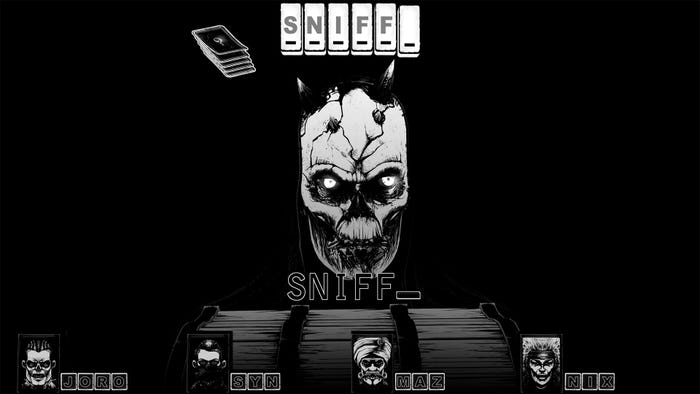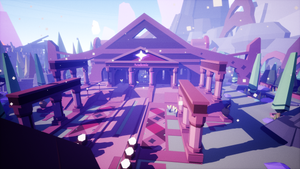
Featured Blog | This community-written post highlights the best of what the game industry has to offer. Read more like it on the Game Developer Blogs.
Objective/Gameplay Dissonance
Objectives shouldn't be distractions, they should be systems that reward excellence at core gameplay, or teamwork.

Multiplayer-centric videogames have always struggled, like a valleygirl, to stand out amongst the crowd. They are inwardly insecure about their core values. Unfortunately instead of accentuating their natural beauty, it is a habit of certain videogames to doll themselves up with tacky dress and loud makeup.
The Western-themed third-person-shooter Lead and Gold is an apt and timely example. One of their modes asks the players to cut into their deathmatching by carrying powder kegs to destroy obstacles and then to pick up gold and bring it to a point to capture.
As the guys at Giant Bomb led me to believe in their video preview, and as I went on to confirm, players would much rather sling lead than carry things.
Asking players in a shooting game to perform tasks that don't involve or support their shooting activities is -- well, it's lame. It's not fun. Should the player choose to pick up the gold the game may have a small chance of becoming a "Run while protected by teammates and score a goal" experience, but it is much more likely, and at the forefront of a player's mind, that it should become a "Pick up the item that makes me unable to shoot, wherein I get absolutely vanquished" experience.
Strangely this same sort of mechanic worked in Unreal Tournament 2004 with their Bombing Run mode -- essentially a game of football where a tackle is a bullet to the brain and passes are shot out of a gun.
So this is to say that slightly non-shooty game modes are not ruinous (or more broadly, non-core-mechanic modes) but are rather finnicky in their design. The thing that made ball-carrying in UT2K4 compelling was that it was actually a lot like shooting.
A popular tactic for ball carriers was to "pass" the ball to an enemy assailant, shooting it at them. The enemy would be forced to catch it and the passer would blow him away with a rocket and continue on his way with the ball.
In Lead and Gold you must opt into a slow, dangerous, un-fun mechanic that renders you helpless. So -- most people don't do it. Because most people don't do it, new players don't see it happening often. Even if you lose the match, you had more fun blasting people. And that's the point, isn't it?
Another example of this sort of dissonance are the objectives in Rush mode in Battlefield: Bad Company 2. I'll compare it to the more traditional Battlefield mode of Conquest.
In Rush there are two M-COM stations to be blown up by an attacking team. � The defending team must prevent this or be pushed back to newly opened sections of the map with more M-COM defend points in them, until they lose their last two stations and the game.
What happened in the beta was less than fun. At the time about three slabs of C4 would destroy an M-COM station. So while the defenders were trying to play Battlefield, an attacking team would send an ATV packed full of explosives to each M-COM station and detonate them. Sometimes this would happen in under a minute, and the defenders would be pushed back.
Conquest on the other hand has players capturing flag areas around the map which deplete enemy points or, in Battlefield-ese, "tickets". I consider this mode the more successful because, rather than having attackers forgo combat to conduct the "strategy" of blowing up an M-COM station, good combat is rewarded with control of a point in Conquest. Being good at shooting, in the game about shooting, lets you win the shooting game. In Rush, players with an expanded explosive pack will just run into buildings, throw six packs onto the M-COM box and detonate themselves. That, or they will detonate the building the station is in to destroy it.
It's a pretty simple concept. Build objectives that reward expertise with the core gameplay; don't build systems that reward forgoing the core gameplay. Otherwise the dominant strategy will either be to forgo the core gameplay for an objective win, or to ignore the objectives.
The worry is always that shooting itself is not always fun. Capture the flag is a fun mode because it gives you impetus. "Oh man, they just took the flag! Where is he? Down in the basement? Get down there and cut him off, I'll get up top and snipe him!"
But we've all also been in that CTF match where nobody leaves the base. Then, an hour in, after the time limit, one sneaky Rambo from the enemy team gets the flag and wins the game. You just spent an hour guarding some dumb flag, barely shooting at anyone, and then you lost because some guy was really good at running away from you. That sends a really weird message to someone toting a rocket launcher: "The LEAST important thing you can do right now is be good at shooting rockets."
Team Fortress 2 is a hallmark of design here. Their Gold Rush mode has players guarding a mine cart into enemy territory in a bloody tug-of-war. Their objectives center combat rather than say "Yeah, we know it's easy to shoot guns these days, so, uh, why don't you try carrying this bag through a hail of gunfire -- fun right?"
About the Author(s)
You May Also Like













